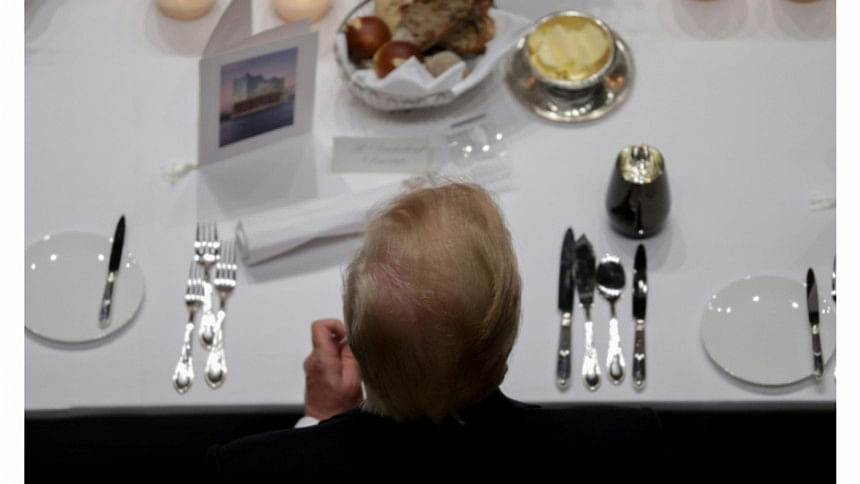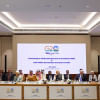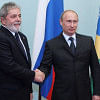Trump versus the rest as violent G20 wraps up

US President Donald Trump remained at loggerheads with fellow leaders Saturday over climate change as the most fractious and violent G20 summit to date drew to a close ahead of fresh mass protests.
Read more: Trump- Putin find chemistry, draw criticism in 1st meeting
Negotiators in Germany worked into the early hours trying to hammer out a final summit statement that at least gives the impression of unity between the unconventional new occupant of the White House and leaders of the world's other top economies.
Hamburg authorities meanwhile braced for another day of demonstrations after two days of running battles between police and anti-capitalist protestors left more than 200 officers injured and a trail of devastation in Germany's second-largest city.
Read more: Ivanka sits in for Trump at G20
Over two days militants torched cars, smashed windows and broke up paving slabs to throw stones at riot police who resorted to water cannon and tear gas as helicopters buzzed overhead, AFP reporters said.
The clashes meant that US First Lady Melania Trump was unable to join fellow leaders' spouses on Friday for a tour of Hamburg harbour, while the car tyres of the Canadian delegation were slashed and roads were blocked by small groups of protestors.
On Saturday several tens of thousands of people were expected to take part in a peaceful protest, and Hamburg police tweeted that the atmosphere was "relaxed" so far. The Bild newspaper reported however the first clashes with smoke rising over the city.
"War, climate change, exploitation are the result of the capitalist system that the G20 stands for and which 20,000 police are here to defend," demonstrator Georg Ismail told AFP.
Bild slammed Chancellor Angela Merkel, the meeting's host, in a stinging editorial, calling the summit a "debacle" for her ahead of elections in September.
"Of course the police did all it could. But the street belonged to the mob," Bild said.
Trump, for his part, praised Merkel for a "fantastic job".
Trump vs Putin
The summit has been anything but harmonious inside the heavily guarded venue.
Trump's most eagerly awaited encounter was a head-to-head with Russia's strongman President Vladimir Putin -- their first -- which lasted two and a quarter hours on Friday.
A day after Trump slammed Moscow's actions in Ukraine and Syria, the two men had a "robust and lengthy exchange" about allegations of Russian meddling in the 2016 US election, Secretary of State Rex Tillerson said.
But Tillerson, who was present at the marathon meeting, said also that the two alpha-male leaders "connected very quickly" with "very clear positive chemistry".
Trump said Saturday that the tete-a-tete was "tremendous".
Trump also met Mexican counterpart Enrique Pena Nieto for the first time as president and insisted that Mexico would "absolutely" pay for his planned border wall -- though Mexico's foreign minister said this was not discussed in their talks.
On Saturday Trump met with British Prime Minister Theresa May and said that his controversial state visit to Britain would go ahead and that he hoped for a "very powerful" trade deal "very, very quickly".
This is despite the EU warning London against negotiating any separate agreement before Britain's divorce from the bloc is complete.
Later Trump was due to meet Chinese President Xi Jinping, where thorny issues are expected to include North Korea after this week's latest missile test, US arms sales to Taiwan and Chinese steel exports.
Xi also met with Japanese Prime Minister Shinzo Abe in talks dominated by the North Korean crisis, with Abe expected to urge Xi to hike the pressure on Pyongyang -- as demanded also by Trump.
Storm over climate
But if Trump and Putin established a rapport, the distance between the US leader and America's long-standing partners has widened with his disdain for the Paris climate accord and his "America First" policy.
According to an EU source, negotiators have agreed a compromise on the wording about trade in the final summit statement with a pledge to combat protectionism while allowing "legitimate" measures to protect markets.
On climate, the communique underlines that the 2015 Paris deal is "irreversible" while "taking note" of Washington's decision to quit the agreement.
The sticking point in the communique is about fossil fuels -- blamed for global warming -- with the US side wanting to be able to continue to export and promote their use.
"The idea now is to find a good balance of language -- it will be discussed this morning," the source said on condition of anonymity.

 For all latest news, follow The Daily Star's Google News channel.
For all latest news, follow The Daily Star's Google News channel. 








Comments